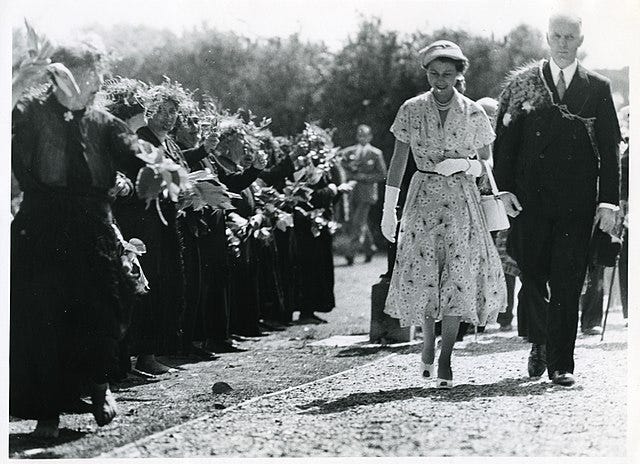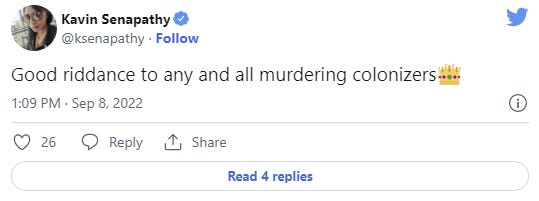The Queen's Last Gift to the World
How Queen Elizabeth II's Royal Influence Disrupted Social Myths

Well, we may have just witnessed the most significant organized world event of the 21st century with the passing of Queen Elizabeth II.
While the royals carried out services with surgical precision, media outlets scrambled to dispatch reporters, and content creators took to the airwaves.
Meanwhile, Alec Baldwin, Hunter Biden, and his dad were grateful for anything that deflected the cameras for a few minutes.
Through September, journalists had an ocean of content to choose from between how London's infrastructure managed thousands of people, various royal family matters, and Princess Charlotte’s balcony moment.
But, of course, without fail, the vile creatures on the far left crept out of the swamp to use the Queen’s passing as an opportunity to promote victimization and social myths.
That’s where we come in.




Regardless of the monarchy’s historical or modern role, to attack the Queen in such an inexcusable manner shows how ignorant people are and that they will say anything for clicks and views.
People such as the authors of the tweets above fail to understand what the Queen personally accomplished over her 70-year reign.
Or, in this context, what she didn’t do.
The world did not mourn a head of state the same way North Koreans “mourned” Kim Jong Il’s death, where citizens only cried because government goons would beat them if they didn’t.
In Queen Elizabeth’s case, people genuinely wept for an individual who donated vast amounts of time and money to countless people.
For example, The Charities Aid Foundation reported the Queen was one of the world’s most philanthropic people by raising over £1.4b by supporting over 500 British charities, such as Cancer Research UK and the British Red Cross.
And that’s just from the Queen’s purse, not including other royal family members.
Yet during the coverage, we found the Queen left one last give for the world.
And Don Lemon opened it on live TV.
Surprise, Don!

During the media circus, people discussed the transfer and power of wealth from the Queen to King Charles III.
With that, of course, came the age-old reparations conversation.
Still, the argument didn’t have the intended effect when CNN’s Don Lemon was humiliated on his show as he questioned why the royal family should share the crown jewels with descendants of slaves:
Then you have those who are asking for reparations for colonialism…$100 billion, $24 billion here and there…some people wanna be paid back, and members of the public are wondering, ‘why are we suffering when you have all this vast wealth?’ those are legitimate concerns. -Don Lemon
Don posed the question to Hilary Fordwich, a royal commentator, and she served the perfect response.
Take a look:
“It’s an interesting discussion, thank you very much I appreciate it,” Don replied.
Welp, that’s what you get, Don, when you work as an ultra-woke activist instead of a journalist.
Generally speaking, there’s nothing wrong with being uninformed or wrong.
But as a highly paid “journalist,” Lemon should have known the answer to that question.
Busting Social Myths
Ms. Fordwich nailed her reply to Don’s reparations suggestion, but let’s add a bit more inconvenient info to bust further the myth that slavery was exclusively a white endeavor.
In April, we discussed 18th-century British culture’s impact on modern black communities, where we briefly reviewed Thomas Sowell’s 2006 book Black Rednecks and White Liberals.
We’ll re-reference that book’s second essay, The Real History of Slavery.
The Real History of Slavery

Slavery existed long before technology allowed humans to travel great distances where they could enslave people with different skin colors.
For many years, Europeans enslaved Europeans, Asians enslaved Asians, and Native Americans enslaved Native Americans.
What separated captivity from freedom had nothing to do with skin color and everything to do with class and vulnerability.
Common people today believe that white people went to Africa to rip people from their homes and families, thanks to films like Roots, whose creator said:
I was just trying to give my people a myth to live by. -Alex Haley, creator, Roots
White slave traders only needed to sail to the coasts of Africa to purchase slaves.
And who waited for them ashore?
Black African slave traders with black African slaves in chains, as Ms. Fordwich mentioned.
What’s more, those African slave traders kept far more slaves for themselves than they sold to any white people that appeared on the coast with a bag of cash.
Here’s an excerpt from RW Beachey’s book, The Slave Trade of Eastern Africa, released in 1976, regarding slavery between African peoples:
In Nyasaland, the Ngoni and Yao swaggered over and terrorized other tribes. In Uganda, the Baganda made life miserable for their neighbours; and the Nyoro and Hima of Ankole enslaved Toro women and children. The Tutsi dominated the Hutu in Ruanda; the Masai lorded over Kikuyu and Kamba, and the latter, in turn, held the Ndorobo in a kind of serfdom. -RW Beachey, The Slave Trade of Eastern Africa, p. 183
White Europeans Ending the Slave Trade
The American Civil War was the bloodiest conflict in US history but ended slavery relatively quickly compared to other parts of the world.
In England, taxpayers paid 20 million pounds to compensate slave owners, equivalent to 17 billion pounds today, and fought the international slave trade for years.
The cost was so high that British taxpayers only paid off the debt in 2015, meaning any British taxpayer directly paid back the treasury that compensated slave owners up to that point.
While the British parliament outlawed slavery with the Slave Trade Act in 1807, the illegal activity continued in open waters and along the coasts of Africa and India, and the British military expended vast resources to enforce the new law.
Even during the Napoleonic Wars, the British Navy reserved ships for hunting slave transports.
When the Brazilians defied anti-slavery efforts, the British threatened to destroy their ships and cut supplies off from the country if they did not cease their illegal operations.
Brazil complied.
And efforts to stop slavery didn’t stop there, as the British bribed the Spanish to cease their slave trade.
Many British seamen died over the years combating slavery at sea, as Mr. Lemon now knows, and many contracted diseases that forced them into early retirement.
Eventually, American and French ships joined the British in the international anti-slavery task force.
As international slave owners saw the British were serious about combatting human trafficking, some criminals built specialized ships to outrun British vessels, such as the Arab “dhows” that allowed slave traders to zip through waters too shallow for European boats.
By 1860 the slave trade mostly stopped, but it took longer to fight in the Persian Gulf.
While the new ships often outran the British, many Arab slave traders faced severe punishment when caught.
To cover their tracks, Arabs often killed the slaves and threw them overboard when capture was inevitable.
So, why do we have books and movies dedicated to making white people the bad guy, yet we don’t hear anything about slave trades in Arab countries, Asia, or Africa?
Or that the British were the first to stamp out slavery?
Why don’t schools teach us about the castration of slaves in the Ottoman Empire?
People today are so concerned about slavery in the US 200 years ago, yet nobody wants to talk about the slave trade that existed in Tanganeka as late as 1922.
We ignore the many black slave owners in the United States or abroad, such as in the Caribbean, where even more black people owned black slaves than in the States.
And it’s inconvenient to mention the countless free black bounty hunters that made a living off chasing down their escaped brethren.

Yet the Trade Continues

None of this is news.
And none of this excuses white European or American participation in slavery.
But the evil business of slavery is a human crime, and no one group of people is responsible.
As Sowell says, we don’t attribute famine or disease to one particular group of people.
Everyone suffered from both many times throughout history.
But as Queen Elizabeth II had such a great influence on the world, far-leftists couldn’t resist the sugar high of attacking the royal family or the Queen herself to push a political agenda based on lies.
Thanks to that influence, and Ms. Fordwich, the truth is coming out.
But let’s not forget about modern slavery.
Between child labor and authoritarian governments, people are still enslaved in North Korea, China, and many other places.
And human sex and labor trafficking is a lucrative and ongoing international venture.

Or, we could talk about modern-day slavery of the mind.
Far-leftists can’t stand when blacks get real educations, speak the truth, or have their own opinion.
According to radical leftist narratives, blacks must be liberal, or they’re race traitors.
It’s funny how these people can speak such appalling things about the Queen that fulfilled her service and gave time and money to strangers.
Yet, when child killers are drug into the execution chamber, those same people might protest in front of the Huntsville Unit in Texas.
Not that I’m beating a drum for capital punishment, we’ve certainly executed more than a few innocent people.
But even criminals that committed heinous crimes with certainty shouldn’t get the needle, in my opinion.
After all, someone has to remove the unexploded ordnance from yesterday’s battlefields in places like Vietnam and taste-test pet food.
Yeah, it’s a real job.
But now I’ve gone on a tangent, and I’m not sure how to stop, so I’ll leave you with this:
I cannot lead you into battle. I do not give you laws or administer justice but I can do something else - I can give my heart and my devotion to these old islands and to all the peoples of our brotherhood of nations. -Queen Elizabeth II






